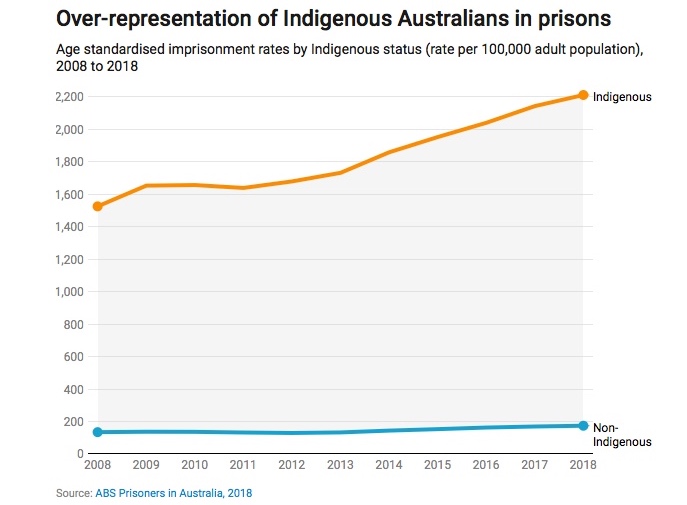
In an article first published on The Conversation, SOPHIE RUSSELL, of UNSW, and CHRIS CUNNEEN, of the University of Technology Sydney, argue that evidence shows investment in designing local solutions to overcome the drivers of crime and incarceration is working to reduce Indigenous incarceration rates…
The over-incarceration of Aboriginal and Torres Strait Islander Australians is one of our nation’s most significant human rights concerns.
Data released last week show the number of people imprisoned in Australia has continued to rise. The rate of Indigenous incarceration has increased by 45 per cent since 2008.

“It is a national shame that Aboriginal and Torres Strait Islander Australians make up two per cent of the total Australian population, but 28 per cent of the adult prison population.”
It is a national shame that Aboriginal and Torres Strait Islander Australians make up two per cent of the total Australian population, but 28 per cent of the adult prison population.
Aboriginal and Torres Strait Islander men are 15 times more likely to be in custody than non-Indigenous men. Aboriginal and Torres Strait Islander women are 21 times more likely to be in custody than non-Indigenous women.
The picture is particularly stark for Indigenous children. They make up seven per cent of the general youth population but 54 per cent of those in youth detention across Australia. This ranges, on average, from 15 per cent in Victoria to 97 per cent in the Northern Territory.
The staggering over-representation of Indigenous people in prison was the focus of the Australian Law Reform Commission report Pathways to Justice – Inquiry into the Incarceration Rate of Aboriginal and Torres Strait Islander People. The report was delivered to the federal attorney-general in December 2017. A year later, the government has yet to respond.
What did the inquiry recommend?
Two key recommendations involved “justice reinvestment”. Justice reinvestment is a strategy for reducing the number of people in prison by investing funds drawn from the corrections budget into early intervention, prevention and diversionary solutions in communities where many prisoners come from and return to.
Justice reinvestment involves working with a community to design local solutions to overcome the drivers of crime and incarceration.
The inquiry recommended an independent justice reinvestment body be set up with Aboriginal and Torres Strait Islander leadership. This would provide technical expertise and promote the reinvestment of resources from the criminal justice system into community-based initiatives.
The inquiry also recommended that governments support justice reinvestment trials in partnership with Aboriginal and Torres Strait Islander communities. This would include allowing access to local criminal justice data, supporting local justice reinvestment initiatives and facilitating participation and coordination between relevant government departments and agencies.
A small number of community-led justice reinvestment trials are taking place throughout Australia. There is widespread support for further advancing justice reinvestment.
Evidence shows justice reinvestment is already working
The Maranguka Justice Reinvestment project in Bourke, New South Wales, is the most developed community-based trial. The Bourke Tribal Council, assisted by Just Reinvest NSW, directs and guides Maranguka.
The project is building a safer and stronger community. This has led to significant reductions in crime and reoffending. From 2016 to 2017, the Bourke community experienced a:
• 23 per cent reduction in police-recorded incidents of domestic violence;
• 14 per cent reduction in bail breaches for adults;
• 42 per cent reduction in days spent in custody for adults;
• 31 per cent increase in year 12 student retention rates; and,
• 38 per cent reduction in charges across the top five juvenile offence categories.
A KPMG impact assessment found the Maranguka project achieved savings of $AUD3.1 million in 2017. Two-thirds of that relates to the criminal justice system and one-third is the broader economic impact in the region.
The financial impact of the project is about five times greater than its operational costs. If Bourke is able to sustain just half the 2017 results, an additional gross impact of $AUD7 million over the next five years could be achieved.
Justice reinvestment offers a solution
“Australia cannot afford the social, health and economic costs of over-imprisonment of Aboriginal and Torres Strait Islander Australians. Strong, healthy and connected communities are the most effective way to prevent crime and make communities safer. Justice reinvestment offers a pathway to achieve this.”
Community leaders, academics and representatives from businesses, non-government organisations and government attended a national justice reinvestment forum in Canberra last week. The message from the forum was clear: solutions to reduce Indigenous imprisonment need to be community-designed and driven, with government support.
Research has found a large portion of prisoners come from and return to a small number of inadequately resourced neighbourhoods and communities. It is well known that prisons are filled with people who are disproportionately disadvantaged and who have unmet social, health and disability-related needs.
Research has also shown that prison does not reduce crime. It actually perpetuates cycles of poverty, disadvantage and reoffending.
It costs almost $AUD300 a day to keep an adult in prison. The average cost of locking up a young person is almost five times that amount.
Aboriginal and Torres Strait Islander over-incarceration cost the Australian economy an estimated $AUD7.9 billion in 2016. These costs are expected to grow to $AUD9.7 billion in 2020 and $AUD19.8 billion by 2040, if we continue on the same trajectory.
Australia cannot afford the social, health and economic costs of over-imprisonment of Aboriginal and Torres Strait Islander Australians. Strong, healthy and connected communities are the most effective way to prevent crime and make communities safer. Justice reinvestment offers a pathway to achieve this.![]()
Sophie Russell is a research associate at UNSW and Chris Cunneen is professor of criminology at the University of Technology Sydney. This article is republished from The Conversation under a Creative Commons license. Read the original article.






